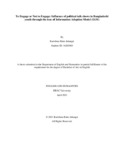| dc.contributor.advisor | Chowdhury, Rukhsana R. | |
| dc.contributor.author | Jahangir, Karishma Binte | |
| dc.date.accessioned | 2022-01-12T08:48:48Z | |
| dc.date.available | 2022-01-12T08:48:48Z | |
| dc.date.copyright | 2021 | |
| dc.date.issued | 2021-04 | |
| dc.identifier.other | ID 16203003 | |
| dc.identifier.uri | http://hdl.handle.net/10361/15887 | |
| dc.description | This thesis is submitted in partial fulfillment of the requirements for the degree of Bachelor of Arts in English, 2021. | en_US |
| dc.description | Cataloged from PDF version of thesis. | |
| dc.description | Includes bibliographical references (pages 46-55). | |
| dc.description.abstract | To begin with, talk shows in Bangladesh tend to become more political by the day as the influence of politics is becoming stronger throughout the country. As the political discourse regarding the two main political bodies of Bangladesh, Awami League and BNP, becomes a heated discussion topic due to the many different aspects of the general election along with policies and other administrative activities, the average political talk show in Bangladesh is getting more importance. From well-known mayor candidates to scholars in the field, these talk shows make sure that any particular issue is being debated over and different perspectives are exposed to the public. The public sphere is now getting more priority than ever. But to what extent? Thus, I believe that my research topic would mainly focus on the influence of talk shows, engagement of the youth population with talk shows and how their information adoption engineers civic engagement and duty. By that, it means that the thesis question will be how the political discourse that takes place in political talk shows are being processed as information for the youth in Bangladesh and how this influences social and civilian engagement, both online and offline. Furthermore, some of the key aims in my research findings will be to analyze how political talk shows came to be, what is the perception of the youth regarding the discourse in political talk shows and how they perceive that information. This will continue through analyzing the different aspects of youth psychology, mindset towards politics, the political situation of Bangladesh, the political discourse that the talk shows are hosting and ultimately, how that data is perceived by the members to contribute to the civil society. | en_US |
| dc.description.statementofresponsibility | Karishma Binte Jahangir | |
| dc.format.extent | 55 pages | |
| dc.language.iso | en | en_US |
| dc.publisher | Brac University | en_US |
| dc.rights | Brac University theses are protected by copyright. They may be viewed from this source for any purpose, but reproduction or distribution in any format is prohibited without written permission. | |
| dc.subject | Information Adoption Model (IAM) | en_US |
| dc.subject | Political talk shows | en_US |
| dc.subject | Youth | en_US |
| dc.subject | Bangladesh | en_US |
| dc.subject.lcsh | Television talk shows -- Bangladesh | |
| dc.subject.lcsh | Television and politics. | |
| dc.title | To Engage or not to engage: influence of political talk shows in Bangladeshi youth through the lens of Information Adoption Model (IAM) | en_US |
| dc.type | Thesis | en_US |
| dc.contributor.department | Department of English and Humanities, Brac University | |
| dc.description.degree | B.A. in English | |

